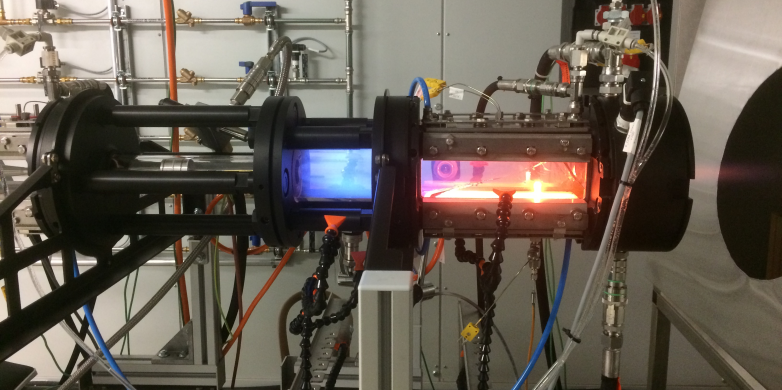Simulating Complex Turbulent Combustion in Novel Gas Turbine Combustors
A research project focusing on sequential combustion technologies for gas turbine applications is conducted at the CAPS laboratory. These new systems will respond to the more and more pressing demand for increased fuel and operational flexibility. One of the main scientific challenges is to reliably simulate these turbulent reacting flows.
The main requirements for the next generation of gas turbine combustors are: Fuel flexibility allowing the operator to burn conventional gas as well as syn(thetic)-gas on demand; Operational flexibility with fast loading capability in order to balance intermittent production of renewable sources and stabilize the future energy networks (the latest technologies can release hundreds of megawatts in less than 10 minutes); High efficiency for less CO2 emissions (the most advanced plants approaching now 65 percent in combined cycle); Reliability and robustness for longer intervals between inspections and more availability; Ultra low NOx and CO emissions over the entire operating concept.
One of the most promising short-term approaches to meet these requirements is based on axial fuel staging, which results in complex turbulent reacting flows with two flames in series. The design and optimization of these sequential combustors significantly relies on the capability to accurately simulate the corresponding combustion processes. In particular, it poses the challenge of correctly capturing turbulence-chemistry interactions and autoignition phenomena. Across these flame fronts of a fraction of a millimeter, the few main species of the reactants are decomposed into hundreds of subspecies and radicals before giving the final hot products. One of the main aims of this research is to develop and experimentally validate automatically-reduced chemical schemes for the numerical simulations of these turbulent reacting flows. SNSF and Ansaldo Energia support this work.
The people involved in this project are Prof. Nicolas Noiray, Oliver Schulz (PhD student), Giacomo Bonciolini (PhD student), Markus Weilenmann (PhD student) and Yuan Xiong (Postdoc).
Prof. Nicolas Noiray is an ESC member and head of the CAPS– Combustion and Acoustics for Power Systems laboratory.
The CAPS laboratory is engaged in activities aiming at addressing fundamental and practical problems that are relevant for the development of workable, efficient, robust and sustainable technologies in Energy and Transport sectors. The laboratory's focus is on reacting and non-reacting flow control and on the reduction of CO2, pollutants and noise emissions.

